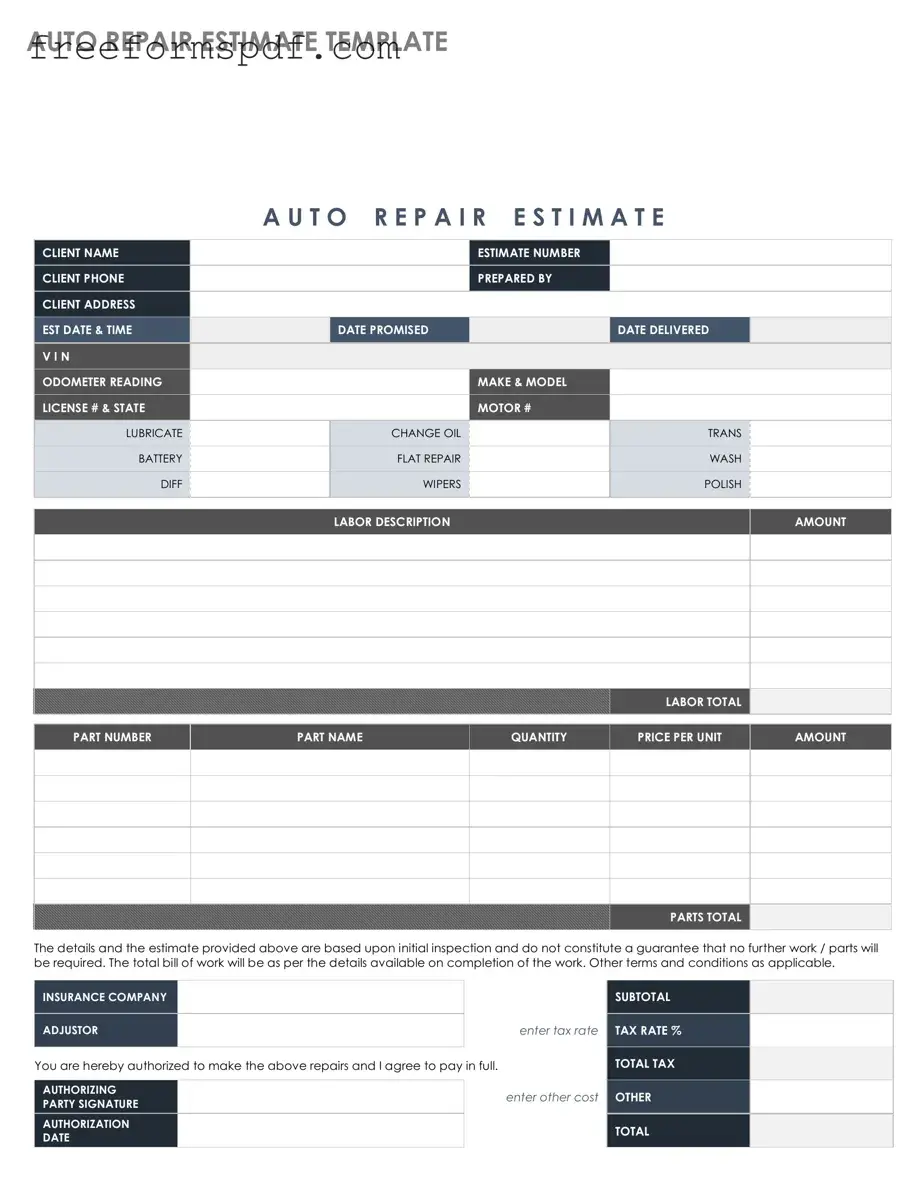Fill in a Valid Auto Repair Estimate Template
Common mistakes
-
Incomplete Information: Many people forget to fill out all the required fields. Missing details like the vehicle identification number (VIN) or contact information can delay the repair process.
-
Incorrect Vehicle Details: Providing the wrong make, model, or year of the vehicle can lead to inaccurate estimates. This mistake can result in unexpected costs or delays in obtaining parts.
-
Neglecting to Describe Symptoms: Failing to clearly describe the issues with the vehicle can hinder the technician's ability to diagnose the problem. A detailed description helps ensure the estimate is as accurate as possible.
-
Not Reviewing the Estimate: Some individuals do not take the time to review the estimate before submitting it. Overlooking details in the estimate can lead to misunderstandings about the services needed and their costs.
Learn More on This Form
-
What is an Auto Repair Estimate form?
The Auto Repair Estimate form is a document that provides a detailed breakdown of the expected costs associated with repairing a vehicle. It typically includes labor charges, parts needed, and any additional fees that may apply. This form serves as a transparent way for customers to understand what to expect financially before proceeding with any repairs.
-
Why do I need an estimate before repairs?
Obtaining an estimate is crucial as it helps you make informed decisions regarding your vehicle's repairs. It allows you to compare prices, understand the scope of work needed, and avoid unexpected costs. By reviewing the estimate, you can also discuss any concerns with your mechanic before any work begins.
-
How is the estimate calculated?
The estimate is calculated based on various factors, including the make and model of your vehicle, the type of repairs needed, and the current labor rates at the repair shop. Mechanics will assess the condition of your vehicle, identify necessary parts, and estimate the time required for repairs. This information is then compiled to create a comprehensive estimate.
-
Can the estimate change after I approve it?
Yes, the estimate can change if additional issues are discovered once the repairs begin. If unforeseen problems arise, the repair shop should contact you to discuss the new findings and provide an updated estimate. Transparency is key, and you should always be informed before any additional work is performed.
-
Is the estimate binding?
An estimate is not a binding contract; it is an approximation of costs. However, once you approve the estimate and the work is completed, you are expected to pay the agreed-upon amount. It’s important to clarify with your mechanic if there are any conditions that might affect the final cost before giving your approval.
Misconceptions
Many people have misunderstandings about the Auto Repair Estimate form. These misconceptions can lead to confusion and frustration when dealing with vehicle repairs. Below are six common misconceptions and clarifications regarding the Auto Repair Estimate form.
- Misconception 1: The estimate is the final price for repairs.
- Misconception 2: All auto repair shops use the same estimating system.
- Misconception 3: An estimate guarantees the completion date of repairs.
- Misconception 4: The estimate includes all potential costs.
- Misconception 5: You must accept the estimate provided.
- Misconception 6: Estimates are legally binding contracts.
This is not true. An estimate provides a preliminary cost based on the technician's assessment. The final price may vary due to additional issues discovered during the repair process.
Different shops may use various estimating systems and software, which can result in varying estimates for the same repair. It is advisable to compare estimates from multiple shops.
An estimate does not guarantee when repairs will be completed. Factors such as parts availability and unexpected complications can affect the timeline.
Estimates often cover the most apparent repairs but may not include additional costs such as taxes, fees, or unforeseen repairs that may arise during the work.
Consumers are not obligated to accept an estimate. They have the right to seek a second opinion or negotiate the terms before proceeding with the repairs.
While estimates are important documents, they are generally not legally binding. They serve as a guideline for expected costs rather than a contract for services.
Browse More Forms
Schedule of Availability Template - Specify if you prefer shifts that end later in the evening.
For individuals considering their healthcare options, understanding the importance of a Medical Power of Attorney document is essential. This legal form empowers a designated person to make critical medical choices on behalf of someone who may be incapacitated, ensuring that one's healthcare wishes are effectively communicated and adhered to.
Advance Salary Format - This form is intended for employees facing temporary cash flow issues.
